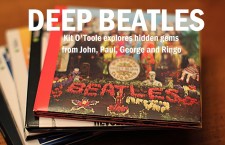Ever since he’d been singled out as a “natural” in A Hard Day’s Night, Ringo Starr had decided he was an actor. Of course, what he was good at was playing Ringo the Beatle, but after Help! there were to be no more Beatles movies (the kind that actually required them to “act,” anyway). So our boy decided to cast about for outside projects.
Ringo Starr’s first film was the 1968 sex romp Candy, which turned out to be one of those British “comedies” that starred an especially attractive young woman getting into all sorts of naughty mischief (see Wonderwall) and a load of artsy-fartsy filmmaking gibberish. This was, of course, the time of heavy drug use among those with money and high profiles (see Head), and so Candy, based on a satirical Terry Southern novel, with a Buck Henry screenplay, probably looked like a laugh riot to those who put it together.
Inexplicably, Ringo was cast as a Mexican gardener who has sex with the titular character (Ewa Aulin) on a pool table. The role required him to do little more than babble in a bad Spanish accent.
Next was The Magic Christian, also by Terry Southern. Everybody knows about this one, because it had a hit song (Badfinger’s “Come and Get It”) and a solid performance from a very funny Peter Sellers. It made tons of money. But have you watched it lately? This was probably Ringo Starr’s second-best performance: He’s laconic, which is what he was in the Beatles movies — but the movie is a queasy mess, another hopelessly dated product of the time.
OK, so the Fabs broke up, and Ringo was set adrift. He then proceeded to appear in one incomprehensible and very, very bad movie after another — Son of Dracula, Blindman, Frank Zappa’s 200 Motels, Ken Russell’s Lisztomania. Somehow, he turned in the best showing of his thespian career in the 1973 rock ‘n’ roll drama That’ll Be the Day — a film starring Britain’s flavor-of-the-year David Essex as an aspiring pop star in the late 1950s. Mr. Starr, looking oh-so Beatlish without his ever-present whiskers, plays the pop star’s pal-on-the-dole.
The film was successful and spawned a sequel, Stardust, which Ringo declined to appear in. Bad move. Instead, he turned up in Sextette, which — with apologies to Ed Wood — is quite possibly the worst movie ever made.
Rarely screened since, it was an “old-fashioned” comedic romp starring Mae West, who was already 122 years old, as a sexy old broad named Marlo Manners from whom men just couldn’t stay away. Laughable for ALL the wrong reasons. Mae’s suitors included Keith Moon, Alice Cooper, Timothy Dalton, Dom DeLuise (?) and, of course, Ringo Starr, who bumbled his way through the inane wink-wink dialogue — written by Mae herself.
Sextette was to be Mae West’s last film. Unfortunately, it wasn’t Ringo’s.
Now, I should point out that by this point (the late ’70s), Ringo Starr was a dithering alcoholic. Every scrap of automatic-pilot goodwill (the pixie dust left hanging in the air around the Beatles) had vanished, and his increasingly bad solo records were tanking on both sides of the Atlantic (and everywhere else, for that matter). Anyone remember Ringo the 4th? Or Bad Boy?
So, what does he do? He takes a role in yet another hopelessly lame comedy, Caveman, for which he doesn’t have to memorize any pesky lines: His character merely grunts. Ringo appeared on TV to plug this movie, and — deep in his cups — responded to every one of interviewer John Davidson’s questions with a series of grunts. Never said a decipherable word. Post-Beatle pixie dust? I don’t think so.
Aside from Paul McCartney’s deeply embarrassing Give My Regards to Broad Street in 1984, Ringo Starr hasn’t made a feature film since. Along with his wife Barbara Bach (they met on the Caveman set), he appeared in two TV movies, Princess Daisy and Alice in Wonderland, both of which sucked out loud.
To his credit, Ringo got sober in the 1980s. And when you ask him these days about his movie career, he’s happy to talk about A Hard Day’s Night and Help! As for the rest of them, he probably pretends — wisely — that they never happened.
- John Lennon and the American Left: ‘Some Time in New York City’ (1972) - August 5, 2015
- Carly Simon – Another Passenger (1976): Forgotten Series - August 1, 2015
- For Crowded House’s 1991 Masterpiece ‘Woodface,’ It Was Death by Chocolate - July 19, 2015




